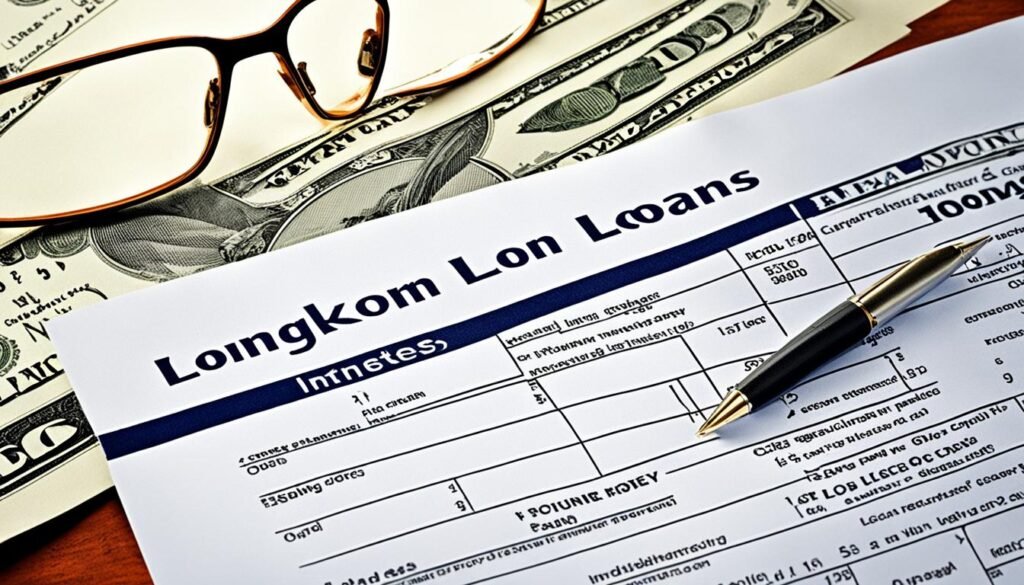Trusted by hundreds of real estate investors, private hard money loans offer quick and flexible financing solutions for various real estate projects. Whether you’re flipping properties, building new ones, or investing in long-term rentals, there are loan products available to meet your unique needs. Options include fix and flip loans, bridge loans for immediate financing, rental loans for income-generating properties, and ground-up loans for new construction projects.
Private hard money loans provide real estate investors with the necessary capital to seize time-sensitive opportunities in the competitive market. With a streamlined approval process and efficient closing, these loans ensure quick funding when it matters most. Real estate investors can rely on private hard money loans to navigate the dynamic landscape with ease.
To better understand the benefits and options of private hard money loans, let’s explore each loan product in detail.
Loan Products for Flipping Properties
When it comes to flipping properties, real estate investors need loan products that provide quick funding and flexible terms. These loan options are specifically designed to meet the unique needs of rehabbing and selling properties in the fast-paced real estate market.
Fix and flip loans offer real estate investors the opportunity to fund their projects swiftly, maximizing profitability. With a streamlined process and efficient closing, investors can secure the necessary funds in a short amount of time.
These loans are tailored to allow investors to quickly purchase, renovate, and sell properties, helping them take advantage of time-sensitive opportunities. With flexible terms, investors have the freedom to structure the loan to meet their specific needs, ensuring a smooth and successful flipping process.
With fix and flip loans, real estate investors have access to the quick funding necessary to acquire properties, finance renovations, and cover other project-related costs. This allows investors to focus on their projects without being hindered by lengthy approval processes or traditional lending restrictions.
Furthermore, fix and flip loans provide real estate investors with the flexibility to adapt to the market’s demands. Whether it’s a hot property in need of immediate attention or a larger-scale renovation, these loans offer the financial support needed to execute successful flipping projects.
Investors can confidently pursue their flipping endeavors knowing that fix and flip loans provide the agility and capital required to navigate the competitive real estate landscape. Real estate investors can maximize their profitability by leveraging these loan products for their flipping projects.
Bridge Loans for Immediate Financing
Bridge loans are a valuable tool for real estate investors in need of immediate financing. These short-term solutions act as a bridge, allowing investors to smoothly transition between different phases of their investment journey. With bridge loans, investors can quickly access capital, enabling them to seize time-sensitive opportunities that require fast funding.
Bridge loans provide the flexibility and agility that real estate investors need to navigate their investment projects. Whether it’s acquiring a new property, renovating an existing one, or preparing for a long-term financing solution, bridge loans offer a quick and efficient way to secure the necessary funds.
With bridge loans, investors can take advantage of time-sensitive opportunities, such as purchasing properties at a favorable price or participating in auctions. The quick access to capital ensures that investors can act swiftly, giving them a competitive edge in a dynamic real estate market.
One of the main advantages of bridge loans is their short-term nature. These loans are typically repaid within a few months to a year, allowing investors to swiftly transition to a more permanent financing solution once their project reaches a certain milestone or is eligible for long-term funding.
Bridge loans also offer flexibility in terms of repayment. Investors have the option to pay interest only during the loan term, allowing them to manage their cash flow effectively. This flexibility is particularly beneficial for investors who plan to renovate or improve the property before refinancing or selling it.
When it comes to securing bridge loans, investors can turn to private lenders who specialize in providing quick access to capital. Private lenders understand the unique needs of real estate investors and have the expertise to evaluate investment opportunities efficiently. They offer streamlined loan processes and faster approval times, allowing investors to secure financing on short notice.
In conclusion, bridge loans offer real estate investors a short-term solution for immediate financing needs. These loans provide quick access to capital, enabling investors to capitalize on time-sensitive opportunities in the fast-paced real estate market. Whether it’s purchasing a new property or financing a renovation project, bridge loans bridge the gap between different stages of the investment journey, ensuring a seamless transition and maximizing investment success.
Rental Loans for Income-Generating Properties
Rental loans are an excellent financing option for real estate investors seeking to generate income through rental properties. These loans provide the long-term stability and predictability necessary to maximize returns on investment. With favorable terms and rates, investors can confidently grow their rental property portfolios over time.
When investing in rental properties, it’s essential to secure financing that aligns with your investment goals and offers stability. Rental loans are specifically designed to support income-generating properties, enabling investors to capitalize on the lucrative rental market.
The Benefits of Rental Loans:
- Long-Term Stability: Rental loans offer extended repayment terms, providing investors with the stability and predictability required to generate passive income through rental properties. This stability allows investors to plan for long-term financial success.
- Favorable Terms and Rates: With rental loans, investors can take advantage of favorable terms and rates that are tailored to the unique demands of rental property investments. This helps to ensure that investment returns are maximized while maintaining a manageable financial commitment.
- Increased Portfolio Growth: By leveraging rental loans, investors can expand their rental property portfolios over time, compounding their income potential. This growth strategy provides the opportunity for increased wealth and financial security.
To illustrate the potential of rental loans, consider the scenario of a real estate investor named Jane who owns a portfolio of residential rental properties. Jane can utilize a rental loan to purchase additional properties, leveraging the rental income generated to cover loan payments and potentially generate additional profit. With favorable terms and rates, Jane can accelerate her portfolio growth and achieve long-term financial success.
Investing in rental properties requires careful planning and the right financial tools. Rental loans offer real estate investors the opportunity to generate consistent income, enjoy long-term stability, and maximize their return on investment. Whether you’re a seasoned investor or just starting, rental loans are a valuable asset in building a successful rental property portfolio.
Ground-Up Loans for New Construction Projects
When it comes to new construction projects, having the right financial backing is crucial for success. That’s where ground-up loans come in. These loans are specifically tailored to meet the unique demands of building projects from the ground up. Whether you’re constructing single-family homes or larger developments, ground-up loans provide the necessary funds to confidently break ground and bring your vision to life.
With ground-up loans, investors can rely on customized financing solutions that are tailored to the specific needs of their construction projects. These loans offer the flexibility and support required to navigate the complexities of building from scratch, ensuring that every aspect of the project is accounted for and funded appropriately.
What sets ground-up loans apart is their focus on meeting the project demands. Unlike other types of financing, ground-up loans are designed to cover the various costs associated with new construction projects, such as land acquisition, building permits, construction materials, labor, and more. This tailored approach ensures that you have the necessary financial resources at every stage of your project, minimizing the risk of running into funding gaps or delays.
Investors who opt for ground-up loans benefit from working with lenders who understand the intricacies of construction projects. These lenders have in-depth knowledge of the construction industry and can provide valuable insights and guidance throughout the financing process. From project feasibility and budgeting to timelines and potential challenges, these experts can help you make informed decisions while offering the necessary financial support.
From a practical standpoint, ground-up loans can provide both short-term and long-term financing options, depending on the duration of the construction project. This flexibility allows investors to choose terms that align with their project timeline and financial goals. Whether you’re constructing a single property or embarking on a larger development, adaptable financing is essential to keeping your project on track.
Ultimately, ground-up loans offer the financial backing needed to turn your construction dreams into a reality. With tailored solutions, a comprehensive understanding of project demands, and the expertise of construction-focused lenders, you can confidently break ground and transform your vision into a completed project.
So, if you’re ready to build from scratch, consider ground-up loans as a viable financing option. With their tailored approach and strong financial backing, these loans can provide the support you need to bring your new construction project to life.
Key Benefits of Ground-Up Loans:
- Tailored financing solutions that meet the demands of new construction projects
- Flexible funding that covers land acquisition, building permits, materials, labor, and more
- Expert guidance from construction-focused lenders
- Short-term and long-term financing options to align with project timelines
In conclusion, ground-up loans provide real estate investors with the financial backing required to embark on new construction projects. Offering tailored solutions and comprehensive support, these loans ensure that your project is well-funded from start to finish, reducing the risk of funding gaps or delays. Whether you’re building single-family homes or larger developments, ground-up loans are a valuable tool that can help turn your vision into a reality.

Hard Money Loans: Creative Capital Solutions
Hard money loans serve as creative capital solutions for real estate investors, connecting them with private lenders who understand the unique needs of the industry. Unlike traditional banks that often have lengthy approval processes, hard money loans offer quick financing, typically within days. This expedited timeline allows investors to seize time-sensitive opportunities without delay.
One of the key advantages of hard money loans is the flexibility it provides. Private lenders evaluate loan applications based on the strength of the collateral, allowing for quicker approval and funding. This means that borrowers can access funds without the same stringent financial criteria imposed by traditional lending institutions.
Real estate professionals can use hard money loans as a solution for various types of investments, such as fix and flip projects, ground-up construction, or acquiring distressed properties. The quick financing provided by hard money loans enables investors to act swiftly and secure profitable deals that may not be available to those relying on traditional financing options.
With hard money lenders understanding the risk criteria associated with real estate investments, investors can obtain the necessary capital to pursue their projects confidently. These lenders evaluate loan applications based on the property’s potential rather than relying heavily on the borrower’s financial history.
Wide Range of Loan Options
When it comes to financing options for real estate investors, hard money lenders offer a wide range of loan options tailored to meet their diverse needs. These lenders understand the unique demands of the real estate market and are equipped to provide the necessary funding for various types of projects. Whether you’re involved in commercial real estate or fix and flip projects, there are loan options available to support your investment goals.
Commercial Real Estate Financing
Hard money lenders offer loan options specifically designed for commercial real estate deals. Whether you’re looking to purchase an office building, multifamily property, retail space, or warehouse, these lenders can provide the financing you need. By leveraging their expertise and industry knowledge, they can help you secure competitive rates and favorable terms for your commercial property investment.
Fix and Flip Loans
For real estate investors engaged in fix and flip projects, hard money lenders offer specialized loan products. These loans provide the necessary capital to acquire, renovate, and sell properties quickly. With competitive rates and flexible terms, fix and flip loans enable investors to maximize their profitability in the fast-paced real estate market.
Residential and Multifamily Property Financing
In addition to commercial real estate and fix and flip projects, hard money lenders also offer loan options for residential and multifamily properties. Whether you’re purchasing a single-family home or investing in a multifamily complex, these lenders can provide the financing you need. With their expertise in the real estate market, they can structure loans that align with your investment strategy and goals.
Customized Financing Solutions
Hard money lenders understand that each real estate project is unique and may require a customized financing solution. Whether it’s a mixed-use property, a special-purpose building, or a development project, these lenders can tailor loan options to meet your specific needs. Their ability to offer flexible financing solutions sets them apart from traditional lenders.
- Commercial real estate financing
- Fix and flip loans
- Residential and multifamily property financing
- Customized financing solutions
When considering loan options for your real estate projects, collaborating with hard money lenders can provide you with the flexibility and support you need. Their wide range of loan options ensures that you can find the financing solution that best aligns with your investment objectives.
Benefits of Private Hard Money Loans
Private hard money loans offer numerous benefits to real estate investors. These loans provide an asset-based approach to lending, enabling faster approval and funding compared to traditional banks. With private hard money lenders, who are often real estate investors themselves, the loan approval process is more efficient, as they understand the risk criteria and underwrite the loan based on the collateral’s strength.
One of the main benefits of private hard money loans is their faster approval and funding process. Unlike traditional banks, which often have lengthy approval timelines, private hard money lenders can provide funding within days. This speed is crucial for real estate investors looking to seize time-sensitive opportunities and secure properties quickly.
The asset-based approach of private hard money loans is another advantage. Instead of primarily considering a borrower’s credit score or financial history, private hard money lenders focus on the value and marketability of the property being used as collateral. This approach allows investors with less-than-perfect credit or unconventional financial situations to access the financing they need for their real estate projects.
Additionally, private hard money loans offer more flexible terms compared to traditional banks. Hard money lenders understand the unique needs of real estate investors and can tailor the loan terms to fit their specific requirements. This flexibility can include options such as interest-only payments, flexible repayment schedules, and customizable loan structures.
Private hard money loans are a powerful tool for real estate investors, providing quick and efficient financing solutions for their projects. Whether it’s for fix and flip properties, immediate financing needs, income-generating rentals, or ground-up construction projects, private hard money loans offer the speed, flexibility, and asset-based approach that can help investors achieve their real estate goals.

Hard Money Loans for Various Property Types
When it comes to financing real estate investments, hard money loans provide a flexible and viable option for investors. These loans are not limited to specific property types but can be used to purchase various properties, including:
- Apartments
- Office buildings
- Commercial properties
What sets hard money loans apart is their ability to finance unique properties that traditional banks may be hesitant to fund. For example, hard money lenders can provide financing for cannabis-related properties, which often face challenges in obtaining funding from conventional lenders. This makes hard money loans a valuable resource for investors in the rapidly growing cannabis industry.
Moreover, hard money lenders understand the potential of these unique property types and are willing to offer higher loan-to-value ratios to mitigate risk. This means that even if a property doesn’t meet the stringent requirements of traditional lending institutions, hard money lenders can still provide the necessary financing, allowing investors to take advantage of lucrative opportunities.
Investing in different property types can diversify an investor’s portfolio and maximize their returns. With hard money loans, investors have the flexibility to pursue various property types, including those that may not fit within the criteria established by traditional lenders.
Process and Requirements for Hard Money Loans
Obtaining a hard money loan involves a straightforward process and specific requirements. Whether you’re a seasoned real estate investor or a beginner, understanding these steps can help you navigate through the loan application efficiently.
1. Prequalification
The first step in the hard money loan process is prequalification. During this stage, borrowers provide detailed financial and property information to the lender. This includes income documentation, credit history, and information about the property being used as collateral. Prequalification allows the lender to assess the borrower’s eligibility for the loan.
2. Loan Application
After prequalification, borrowers proceed with the loan application. They submit all the necessary documentation, such as bank statements, tax returns, and proof of identity, to support their loan request. The application package is then reviewed by the lender to determine if the borrower meets the criteria for funding.
3. Loan Processing Administration
Once the loan application is submitted, it goes through a processing administration phase. During this stage, the lender’s team reviews the application, verifies the documentation, and conducts a comprehensive analysis of the proposed property. This assessment includes a thorough evaluation of the property’s value, marketability, and potential profitability.
4. Underwriting
The underwriting process is a critical step in the hard money loan process. During underwriting, the lender assesses the risk associated with the loan and determines the terms, conditions, and loan amount. This evaluation focuses on the strength of the collateral and the borrower’s ability to repay the loan. The underwriter ensures that the loan aligns with the lender’s risk tolerance and guidelines.
5. Approval and Closing
Once the loan application has successfully passed underwriting, it receives final approval. At this stage, the lender issues a Loan Commitment Letter, detailing the loan terms and conditions. The borrower reviews the commitment letter, and if they accept the terms, they proceed to the closing stage. During closing, all legal documents are prepared, signed, and executed. The borrower provides the required funds for the down payment and closing costs, and the loan is funded.
It’s important to note that the hard money loan process typically has a quicker approval timeline compared to traditional banks. However, borrowers should be prepared for certain requirements, such as a larger down payment and shorter repayment terms. Understanding the process and meeting the necessary qualifications can help borrowers secure the funding they need.
Pros and Cons of Hard Money Loans
When considering hard money loans, it’s important to weigh the advantages and disadvantages. These loans offer several benefits compared to traditional lenders, including:
- Quick Approval: Hard money loans typically have a faster approval process, allowing borrowers to access funds more quickly for their real estate projects.
- Flexible Terms: Unlike traditional lenders, hard money lenders offer more flexibility when it comes to loan terms. This can be especially advantageous for real estate investors who need customized financing solutions.
However, hard money loans also come with some drawbacks that borrowers should consider:
- Higher Interest Rates: Hard money loans often have higher interest rates compared to traditional lenders. This is due to the increased risk associated with these types of loans.
- Potentially Higher Fees: Borrowers may also encounter higher origination and loan-servicing fees with hard money loans.
- Shorter Repayment Requirements: Hard money loans typically have shorter repayment terms, which can be challenging for borrowers who require longer periods to pay off their loans.
These pros and cons should be carefully evaluated to determine if hard money loans are the right financing option for your real estate investment needs.
Conclusion
Private hard money loans offer real estate investors fast financing solutions that allow them to seize time-sensitive opportunities with confidence. With a wide range of loan products and flexible terms, investors can leverage these loans to fund their flipping properties, rental investments, new construction projects, and more.
While hard money loans may come with higher interest rates and shorter repayment terms, they serve as a valuable tool for quick real estate funding. The speed and efficiency of hard money lenders enable investors to capitalize on deals that traditional lenders might not approve in time.
Whether you’re an experienced investor or just starting in the real estate market, private hard money loans provide the necessary financial support to bring your projects to life. From fix and flips to ground-up construction, these loans offer fast financing and real estate funding solutions, propelling your success in the ever-changing real estate landscape.
FAQ
What are private hard money loans?
Private hard money loans are quick and flexible financing solutions for real estate projects, offering fast funding and flexible terms compared to traditional banks.
What loan products are available for flipping properties?
For flipping properties, you can consider fix and flip loans which provide quick funding and flexible terms to ensure success in the fast-paced real estate market.
What are bridge loans and why are they useful?
Bridge loans are short-term solutions that provide immediate financing, allowing investors to take advantage of time-sensitive opportunities that require fast funding.
How do rental loans benefit real estate investors?
Rental loans offer long-term stability and predictability, maximizing the return on investment for investors focused on generating income through rental properties.
What are ground-up loans and when are they used?
Ground-up loans are tailored to meet the specific demands of new construction projects, providing the financial backing needed for confidently breaking ground.
What are hard money loans and how do they work?
Hard money loans connect real estate professionals with private lenders, offering quick financing within days compared to traditional banks. They are underwritten based on the collateral’s strength, resulting in faster approval and funding.
What loan options do hard money lenders offer?
Hard money lenders offer various loan options for commercial real estate deals, competitive rates for fix and flip projects, and financing for different property types such as multifamily, residential, retail, and warehouse properties.
What benefits do private hard money loans provide?
Private hard money loans provide an asset-based approach to lending, enabling faster approval and funding compared to traditional banks. Private hard money lenders understand the risk criteria and underwrite loans based on the collateral’s strength.
What types of properties can hard money loans be used to purchase?
Hard money loans can be used to purchase various types of properties including apartments, office buildings, commercial properties, and even unique properties that traditional banks may not finance, such as cannabis-related properties.
What is the process and requirements for getting a hard money loan?
The process for getting a hard money loan involves prequalification, submitting a loan application, loan processing administration, underwriting, approval, and closing. While hard money loans have a quick approval process, they may require a larger down payment and have shorter repayment terms.
What are the pros and cons of hard money loans?
Hard money loans offer quick approval and flexible terms compared to traditional lenders. However, they often have higher interest rates, potentially higher origination and loan-servicing fees, and shorter repayment requirements that can be challenging for borrowers.
How do private hard money loans provide fast financing solutions?
Private hard money loans provide real estate investors with fast financing solutions, allowing them to capitalize on time-sensitive opportunities and leverage different loan products for various real estate projects.



























































